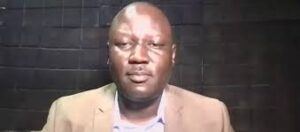Journalists have been allowed back to cover the trial of South Sudan’s suspended First Vice President Riek Machar and seven co-accused, the head of the country’s journalists’ union said on Tuesday, after a dispute over a leaked audio recording from the courtroom.
Security forces blocked independent reporters from entering the Freedom Hall, where the special court is sitting, last Wednesday without giving a reason. The move came despite previous sessions being open to the public and press.
Oyet Patrick Charles, president of the Union of Journalists of South Sudan (UJOSS), told Radio Tamazuj that the restriction was imposed after a journalist uploaded an audio recording from an Oct. 3 court session online, raising concerns among security personnel.
“The problem began after one of our colleagues uploaded an audio recording from the court session online,” Oyet said. “When the security personnel saw it, it raised concerns and led to the restriction of journalists. But I am happy to say that the matter has now been clarified and resolved.”
Oyet attributed the incident primarily to poor coordination between government institutions, including the security organs, the court, the Ministry of Justice and the Media Authority.
“The court could be saying it’s open to the public, but the security personnel at the door aren’t informed,” he said.
Following the restriction, UJOSS engaged with the Media Authority and the Ministry of Justice to resolve the issue. Oyet said the Media Authority had now stationed a permanent representative at the court to coordinate communication and prevent future misunderstandings.
“As of now, there are no major issues, unless new ones emerge,” Oyet said.
While reaffirming the right of journalists to cover proceedings, Oyet reminded them to respect the court’s rules, which may prohibit audio or video recording.
“If the court says ‘don’t record,’ we should not record,” he stated. “You can listen, take notes, and write your story based on what you heard. The court has its own camera for official recording, so we should respect that.”
The leaked audio contained Machar challenging the court’s legitimacy. In the recording, Machar, 73, stated that he did not recognize the investigating committee because it was convened by the National Security Service and the Ministry of Justice instead of the internationally-mandated Ceasefire and Transitional Security Arrangements Monitoring and Verification Mechanism (CTSAM).
He also asserted his immunity from prosecution as first vice president.
In a related development during Monday’s session, Machar’s defence team argued that the special court was operating unlawfully. The lawyers contended that the court’s one-month legal mandate, granted by the justice ministry, had expired last week.
The prosecution, meanwhile, requested more time to coordinate witnesses and prepare evidence. The court’s next session is scheduled for Wednesday, Oct. 15.
The case, which began on Sept. 22, involves Machar and seven co-accused. They face charges including treason, crimes against humanity, mass murder, terrorism and destruction of property related to attacks on an army base in Nasir County in March 2025.
The government alleges the assaults, which killed Gen. David Majur Dak and dozens of soldiers, were carried out by Machar’s Sudan People’s Liberation Movement/Army-in-Opposition and an allied militia known as the White Army.




